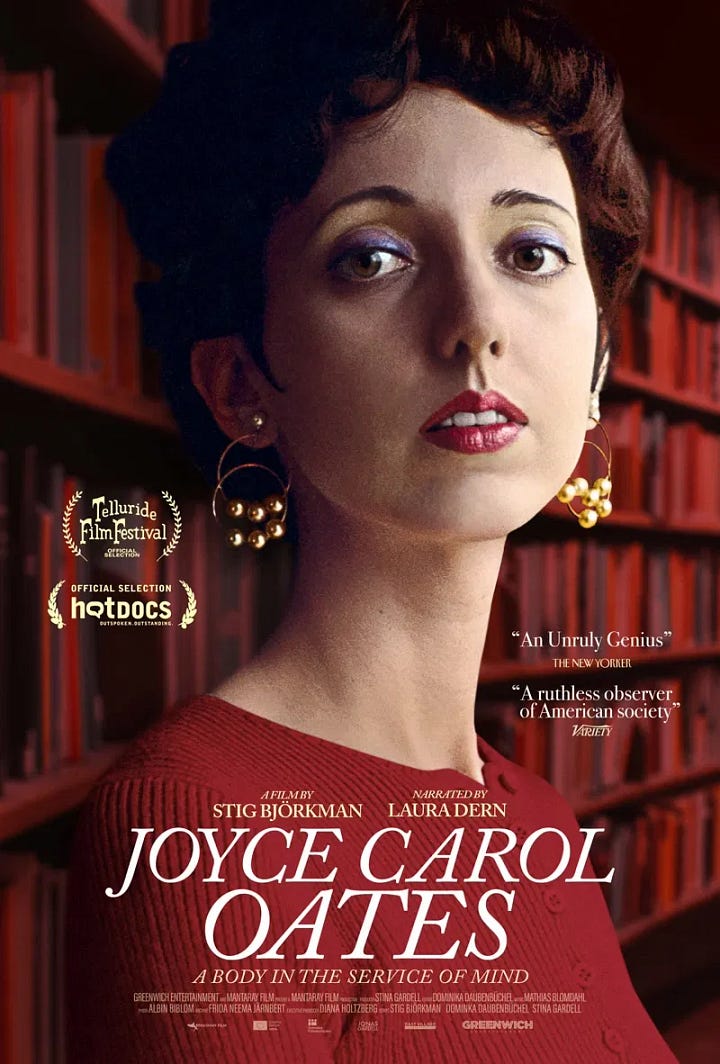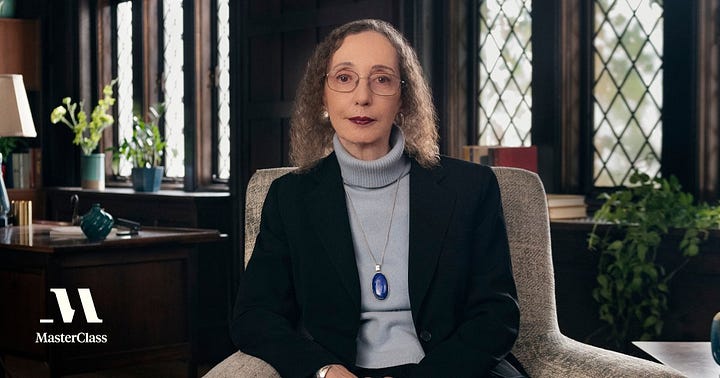Joyce Carol Oates: “Literary Wonder Woman”
And David Bowie's Life-Saving Advice for Artists
Joyce Carol Oates, born June 16, 1938 in Lockport, NY and grew up in a working class farming community. At nearly 87 years old, fellow Substacker is still going strong. She currently teaches at Rutgers, is retired from teaching at Princeton University, and has been dubbed a “Literary Wonder Woman.”


She says she never planned her career or even looked toward the future, she simply focuses on one project at a time.
Best known for We Were the Mulvaneys (1996) and Blonde (2000), Mulvaneys is about the disintegration of a family. It was picked for Oprah's Book Club in 2001 and made into a TV movie. Blonde (2000) was made into a feature film about Marilyn Monroe’s life and death in 2022.
Books
Oates has written over 100 books, including novels, novellas, plays, poetry and criticism, some under the pseudonyms Rosamond Smith and Lauren Kelly.
Recurring themes are rural poverty, racial and class tensions, power dynamics, the abuse of power, crime and violence.
Her first book, a short-story collection entitled By the North Gate (1963) was published by Vanguard Press. The president of Vanguard was convinced of Joyce Carol Oates’ genius at their first meeting.
The short story "In a Region of Ice" (The Atlantic Monthly, August 1966) is about a gifted Jewish-American student who gets caught up in the anti-establishment protests of the time, becomes depressed, and is involved in a murder-suicide. The story was inspired by real life events in an acquaintance’s life, and was discussed in the title story of Last Days: Stories (1984). Each story won an O. Henry Award.
She is also known for the novella “Black Water” (1992) based on Senator Ted Kennedy’s Chappaquiddick fiasco, in which his car ended up underwater, causing the drowning of his young passenger Mary Jo Kopechne. The book was nominated for a Pulitzer. [The Chappaquiddick scene is sort of recreated in Brian De Palma’s 1981 film “Blow Out” starring John Travolta, raising questions about why it happened. And a major American private military contractor called itself Blackwater in 1997, a name synonymous with “modern warfare’s darkest chapter,” not making us safe and secure, as pretended, but needlessly destroying our security. Wasn’t that the agenda all along? In 2009, Blackwater changed its name to Xe, then Academi, and now it goes by Constellis.]
Her books have won many awards including the National Humanities Medal and the National Book Award. Since at least the early 1980s, Oates has been a favorite to win the Nobel Prize in Literature. Perhaps it will yet happen. Thus far, she has been nominated for a Pulitzer Prize 5 times.
Upbringing, Training & Family
Oates studied at the same one-room schoolhouse her mother attended. Her writing career really began when her paternal grandmother gave her a typewriter and she started writing at age 14. Soon afterward, young Joyce Carol Oates won a Scholastic Art and Writing Award for her writing, and worked on the high school newspaper. She was the first person in her family to graduate from high school.
She then won Mademoiselle Magazine’s “college short story” contest at age 19. Oates attended Syracuse University on a scholarship, and trained herself to write by “writing novel after novel and always throwing them out when I completed them.”
Writers whose "influences remain very deep" are Lewis Carroll who wrote Alice's Adventures in Wonderland (1865), "the great treasure of my childhood,” Charlotte Brontë, Emily Brontë, Fyodor Dostoevsky, William Faulkner, Ernest Hemingway, Henry David Thoreau, Franz Kafka, D. H. Lawrence, Thomas Mann and Flannery O'Connor.
Violence was a part of her community and family history. As a child, a next-door neighbor was imprisoned for trying to murder of his family, her maternal grandfather was murdered in 1917, and her beloved grandmother who lived with her family survived a murder-suicide attempt at the hands of the grandmother’s own father, who died. Oates did not learn of this until after her grandmother’s death.
Her paternal grandmother's life was Oates’ inspiration for writing The Gravedigger's Daughter (2007).
Oates had a great marriage with fellow University of Wisconsin–Madison graduate student Raymond J. Smith, soon to become a professor of 18th-century literature. Not having children freed her to focus on her work. The pair founded The Ontario Review in 1974 in Canada. Oates said it was "a marriage of like minds – both my husband and I are so interested in literature and we read the same books; he'll be reading a book and then I'll read it – we trade and we talk about our reading at meal times ..." and "a very collaborative and imaginative marriage." She is now widowed.
As of 1999, Oates became a runner. She uses her daily run to works out structural problems in her writing. She said, "Ideally, the runner who's a writer is running through the land- and cityscapes of her fiction, like a ghost in a real setting."
The Simpson Literary Project awards the annual Simpson/Joyce Carol Oates Literary Prize of $50,000 to a mid-career writer.
“Joyce Carol Oates: A Body in the Service of Mind” is a documentary about her life:
MasterClass with Joyce Carol Oates: https://www.bilibili.com/video/BV1iz411i7eC/
David Bowie's Life-Saving Advice for Artists
"You will never be criticized by someone who is doing more than you. You will only be criticized by someone doing LESS than you." -Lucy Sheridan



